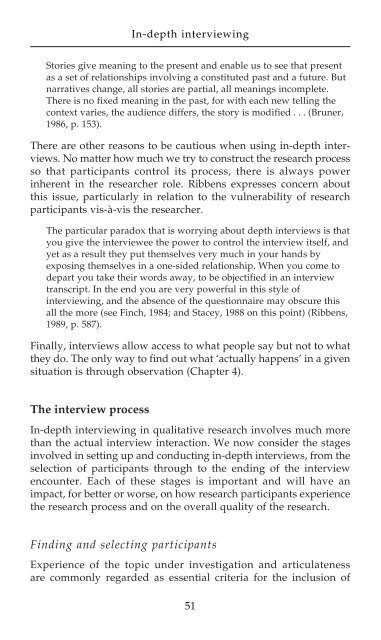Qualitative Research in Practice : Stories From the Field - Blogs Unpad
Qualitative Research in Practice : Stories From the Field - Blogs Unpad
Qualitative Research in Practice : Stories From the Field - Blogs Unpad
Create successful ePaper yourself
Turn your PDF publications into a flip-book with our unique Google optimized e-Paper software.
In-depth <strong>in</strong>terview<strong>in</strong>g<br />
<strong>Stories</strong> give mean<strong>in</strong>g to <strong>the</strong> present and enable us to see that present<br />
as a set of relationships <strong>in</strong>volv<strong>in</strong>g a constituted past and a future. But<br />
narratives change, all stories are partial, all mean<strong>in</strong>gs <strong>in</strong>complete.<br />
There is no fixed mean<strong>in</strong>g <strong>in</strong> <strong>the</strong> past, for with each new tell<strong>in</strong>g <strong>the</strong><br />
context varies, <strong>the</strong> audience differs, <strong>the</strong> story is modified . . . (Bruner,<br />
1986, p. 153).<br />
There are o<strong>the</strong>r reasons to be cautious when us<strong>in</strong>g <strong>in</strong>-depth <strong>in</strong>terviews.<br />
No matter how much we try to construct <strong>the</strong> research process<br />
so that participants control its process, <strong>the</strong>re is always power<br />
<strong>in</strong>herent <strong>in</strong> <strong>the</strong> researcher role. Ribbens expresses concern about<br />
this issue, particularly <strong>in</strong> relation to <strong>the</strong> vulnerability of research<br />
participants vis-à-vis <strong>the</strong> researcher.<br />
The particular paradox that is worry<strong>in</strong>g about depth <strong>in</strong>terviews is that<br />
you give <strong>the</strong> <strong>in</strong>terviewee <strong>the</strong> power to control <strong>the</strong> <strong>in</strong>terview itself, and<br />
yet as a result <strong>the</strong>y put <strong>the</strong>mselves very much <strong>in</strong> your hands by<br />
expos<strong>in</strong>g <strong>the</strong>mselves <strong>in</strong> a one-sided relationship. When you come to<br />
depart you take <strong>the</strong>ir words away, to be objectified <strong>in</strong> an <strong>in</strong>terview<br />
transcript. In <strong>the</strong> end you are very powerful <strong>in</strong> this style of<br />
<strong>in</strong>terview<strong>in</strong>g, and <strong>the</strong> absence of <strong>the</strong> questionnaire may obscure this<br />
all <strong>the</strong> more (see F<strong>in</strong>ch, 1984; and Stacey, 1988 on this po<strong>in</strong>t) (Ribbens,<br />
1989, p. 587).<br />
F<strong>in</strong>ally, <strong>in</strong>terviews allow access to what people say but not to what<br />
<strong>the</strong>y do. The only way to f<strong>in</strong>d out what ‘actually happens’ <strong>in</strong> a given<br />
situation is through observation (Chapter 4).<br />
The <strong>in</strong>terview process<br />
In-depth <strong>in</strong>terview<strong>in</strong>g <strong>in</strong> qualitative research <strong>in</strong>volves much more<br />
than <strong>the</strong> actual <strong>in</strong>terview <strong>in</strong>teraction. We now consider <strong>the</strong> stages<br />
<strong>in</strong>volved <strong>in</strong> sett<strong>in</strong>g up and conduct<strong>in</strong>g <strong>in</strong>-depth <strong>in</strong>terviews, from <strong>the</strong><br />
selection of participants through to <strong>the</strong> end<strong>in</strong>g of <strong>the</strong> <strong>in</strong>terview<br />
encounter. Each of <strong>the</strong>se stages is important and will have an<br />
impact, for better or worse, on how research participants experience<br />
<strong>the</strong> research process and on <strong>the</strong> overall quality of <strong>the</strong> research.<br />
F<strong>in</strong>d<strong>in</strong>g and select<strong>in</strong>g participants<br />
Experience of <strong>the</strong> topic under <strong>in</strong>vestigation and articulateness<br />
are commonly regarded as essential criteria for <strong>the</strong> <strong>in</strong>clusion of<br />
51

















